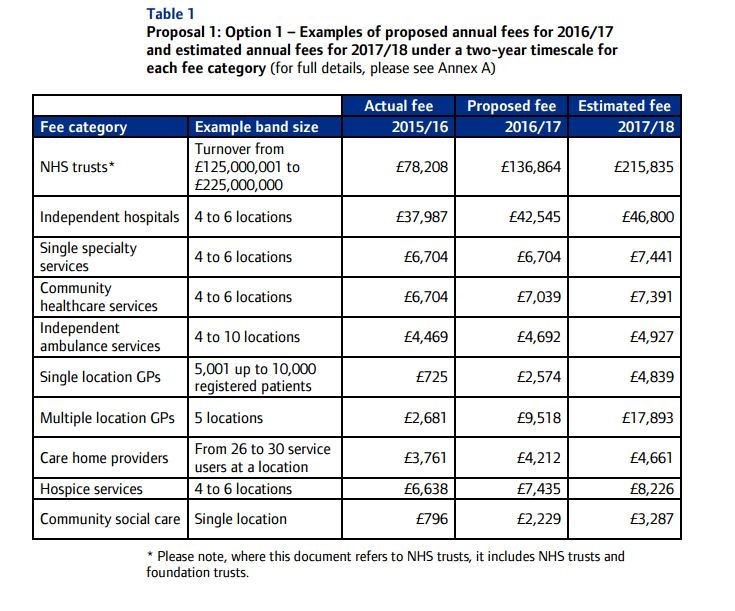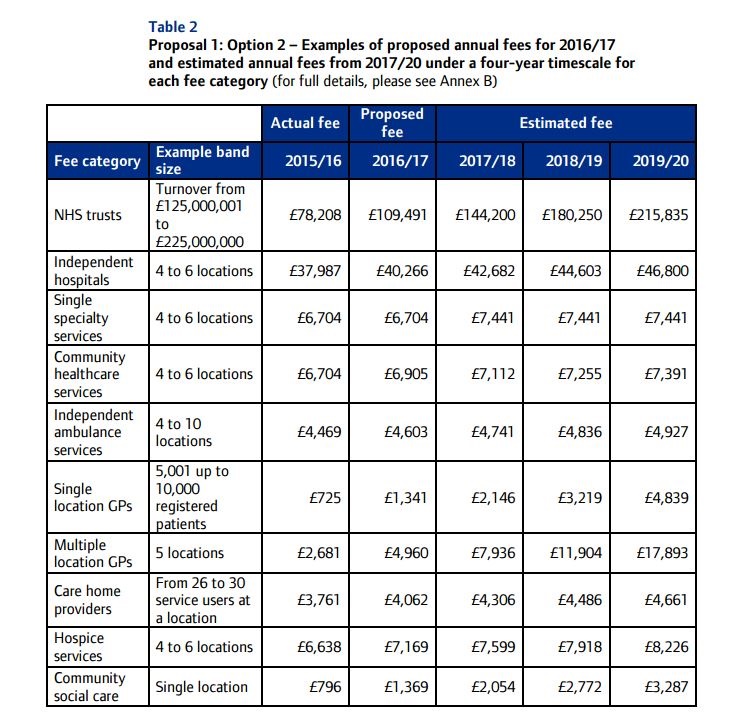03.11.15
Some providers face near seven-fold increase in CQC fees
The fees that mid-sized NHS trusts and foundation trusts must pay to the Care Quality Commission (CQC) could nearly treble by 2017-18, a new consultation has revealed.
Some GPs will be paying nearly seven times as much now.
The CQC’s document outlines two scenarios for future provider fees, which help fund the regulator. The CQC is asking providers for feedback on whether the rate of the changes to ‘full cost recovery’ should take place over two or four years, starting from 1 April 2016.
Under the first option, based on a two-year timescale, NHS trusts with a turnover of £125m to £225m could see their annual fee increase by 75% from £78,208 in 2015-16 to £136,864 in 2016-17. The fee would then increase to £215,835 in 2017-18.

In the second option, staggered over a four-year period, trusts would see their fee increase by almost 40% to £109,491 next year – rising again to £215,835 but by 2019-20

NHS GP practices also face significantly increased fees. For instance, single location GPs with 5,001 to up to 10,000 registered patients could see their fee increase by 255% from £725 to £2,574 under the two-year timescale.
The CQC said that the proposed increases were because in recent years the rise in costs of regulation had “out-stripped increases in fees, and cost recovery levels fell”.
David Behan, CEO of the CQC, said: “Our commitment is to make sure that people receive safe, effective, compassionate and high-quality care and we can see that our new inspection model is allowing us to support providers to do exactly that. The fees providers pay enables this important work to happen.”
He added that while the CQC recognises the financial pressures faced by providers, and does not underestimate the impact of any changes to fees, it is required to move to full cost recovery.
But Rob Webster, chief executive of NHS Confederation, said that increasing the fee by at least 40% will add “considerable burden” on trusts.
“It comes as providers forecast a deficit of around £2bn this year and face £1bn of increased pension payments from 2016-17,” he said. “The goodwill of providers towards CQC and its new approach to inspections could be jeopardised by this fee increase.”
The consultation runs until noon on 15 January 2016. After this, CQC will review all responses and make recommendations to the secretary of state, who is responsible for making the final decision about fees payments, and whose consent is required in order for the scheme to come into effect. CQC expects to publish the final fees scheme in March 2016, for implementation on 1 April 2016.
NHS Providers CEO Chris Hopson added that his organisation appreciates CQC’s position, especially as the regulator could face a significant reduction in grant in aid funding following the Comprehensive Spending Review later this month.
“However, the options set out in the fees consultation document represent a significant increase for our members at a time where they are facing unprecedented pressure to make financial savings,” said Hopson. “It is essential that the CQC’s operating model both adds value and is sustainable in the long term, to avoid placing a disproportionate financial burden on providers.”
It was recently reported that proposed changes to the way the CQC works outlined in its 2016-21 strategy could include moving to a co-regulation regime, where providers proactively assess their own quality of care and report back on changes since previous inspections.
Additionally, all directorates within the CQC are behind in hitting their inspection targets and, since no decision has been made on budget allocation and fee agreements, the organisation cannot guarantee it will deliver its programme by 2016-17.